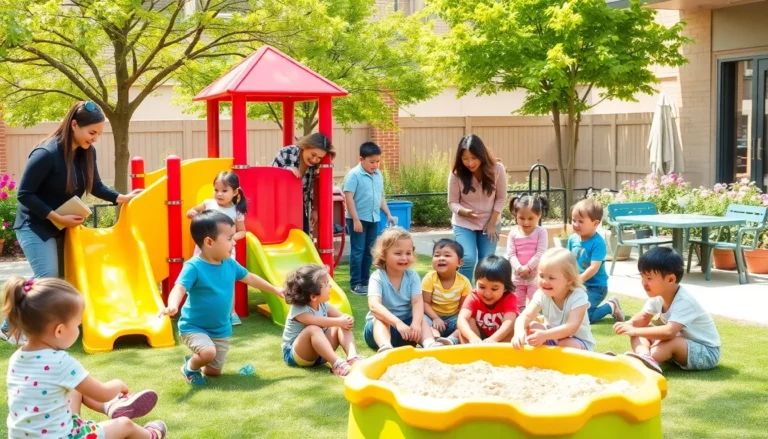Imaginative play is like a magic portal that transports kids to worlds where anything is possible. Whether they’re donning a cape to save the day or building a fort to defend against imaginary dragons, this type of play fuels creativity and problem-solving skills. It’s not just child’s play; it’s a vital part of development that shapes their understanding of the world.
Table of Contents
ToggleUnderstanding Imaginative Play
Imaginative play represents a vital part of childhood development, enabling children to engage creatively. This type of play allows kids to express feelings and thoughts through various scenarios.
Definition and Characteristics
Imaginative play includes activities where children create roles and stories. It features elements like pretending, role-playing, and building narratives. Characteristics often involve creativity, flexibility, and spontaneity. Kids may transform everyday objects into magical items. For example, a simple box can become a spaceship, fostering imaginative ideas. This engaging form of play promotes independent thinking and exploration of complex concepts.
Importance in Child Development
Imaginative play plays a significant role in cognitive growth. It enhances problem-solving skills as children navigate different situations. Communication skills improve as they negotiate roles and describe scenarios. Social skills develop through interaction with peers or siblings. Research indicates that children who engage in imaginative play exhibit greater emotional intelligence. They learn to understand different perspectives and manage their feelings, establishing a foundation for lifelong social interactions.
Types of Imaginative Play

Imaginative play manifests in various forms, each contributing uniquely to a child’s development. Two prominent types include pretend play and symbolic play.
Pretend Play
Pretend play involves children acting out scenarios and inventing roles. They often take on characters, such as pirates, astronauts, or animals, which encourages creativity and storytelling. Scenarios may include settings like a kitchen or a jungle, allowing children to explore different environments. During this type of play, kids learn valuable social skills. Interaction with peers enhances cooperation and negotiation skills, fostering friendships and teamwork. Pretend play also helps children process emotions by acting out various situations. For example, they might reenact a doctor visit, alleviating fears.
Symbolic Play
Symbolic play utilizes one object to represent another, showcasing a child’s ability to think abstractly. Children often use everyday items, such as a stick as a sword or a blanket as a cape. This type of play enhances cognitive abilities, including problem-solving and reasoning skills. Engaging in symbolic play encourages imagination. Kids express themselves through creativity, developing narrative skills as they create stories around their scenarios. Role reversal occurs frequently, helping children understand different perspectives. Symbolic play can also aid in language development, as kids explain their actions and ideas to others.
Benefits of Imaginative Play
Imaginative play provides numerous advantages that significantly contribute to a child’s growth. Many benefits arise in cognitive and social realms, enhancing overall development.
Cognitive Development
Cognitive development thrives during imaginative play. Problem-solving skills improve as children confront challenges in their made-up worlds. They learn to strategize and make decisions, enhancing critical thinking. Furthermore, narrative creation fosters language skills as children articulate their stories and ideas. This expressive process also encourages them to explore complex concepts, sharpening their understanding of the environment. Research shows that children engaged in imaginative play can better grasp abstract ideas, leading to greater mental flexibility. Engaging in varied scenarios enhances memory retention while boosting creativity. These cognitive advancements prepare children for future academic success and effective communication.
Social Skills Enhancement
Social skills significantly benefit from imaginative play. Children learn cooperation and teamwork by sharing roles and responsibilities in group activities. This interaction fosters empathy, as they navigate different characters’ feelings and viewpoints during their play. Emphasizing negotiation skills, children often face conflicts while playing and must find mutual solutions. These experiences lead to improved communication, as they express opinions and ideas clearly. Additionally, understanding social norms becomes easier when children mimic adult behaviors in their scenarios. Enhanced emotional intelligence results from role-playing different situations, preparing them for real-life encounters. Ultimately, imaginative play lays a strong foundation for healthy relationships and social interactions throughout life.
Encouraging Imaginative Play
Imaginative play thrives with support and guidance from both parents and educators. Effective strategies create an environment where children’s creativity can flourish.
Strategies for Parents
Encouraging imaginative play starts at home. Create a designated play area filled with open-ended toys like blocks, costumes, and art supplies. Engaging in play alongside children fosters creativity. Suggest scenarios and themes for pretend play, enhancing their imaginative experience. Allow them to lead playtime, empowering their decisions and storytelling abilities. Schedule regular playdates with peers to promote social interaction and cooperation. Observing their playtime helps parents understand their emotional and cognitive development. This awareness strengthens the parent-child relationship, allowing for better support in other areas of learning.
Role of Educators
Educators play a pivotal role in facilitating imaginative play. Integrating imaginative play into the curriculum enriches learning experiences. Providing accessible resources, like books and role-play props, inspires creativity in children. Creating learning environments that encourage role-playing nurtures social skills and collaboration. Teachers can introduce themed activities that promote storytelling and scenario building, encouraging students to express ideas freely. Monitoring children’s interactions during play helps educators assess their development. Such observations guide future educational approaches. With a focus on imaginative play, educators lay a vital foundation that influences children’s cognitive and social growth.
Imaginative play is a vital component of childhood development. It opens doors to creativity and problem-solving while enabling children to express their emotions and understand the world around them. By engaging in pretend and symbolic play, kids not only enhance their cognitive skills but also build essential social connections.
Parents and educators play a crucial role in nurturing this type of play. By creating supportive environments and participating in imaginative activities, they can foster a child’s creativity and emotional intelligence. Ultimately, encouraging imaginative play equips children with the skills necessary for lifelong learning and healthy relationships.




